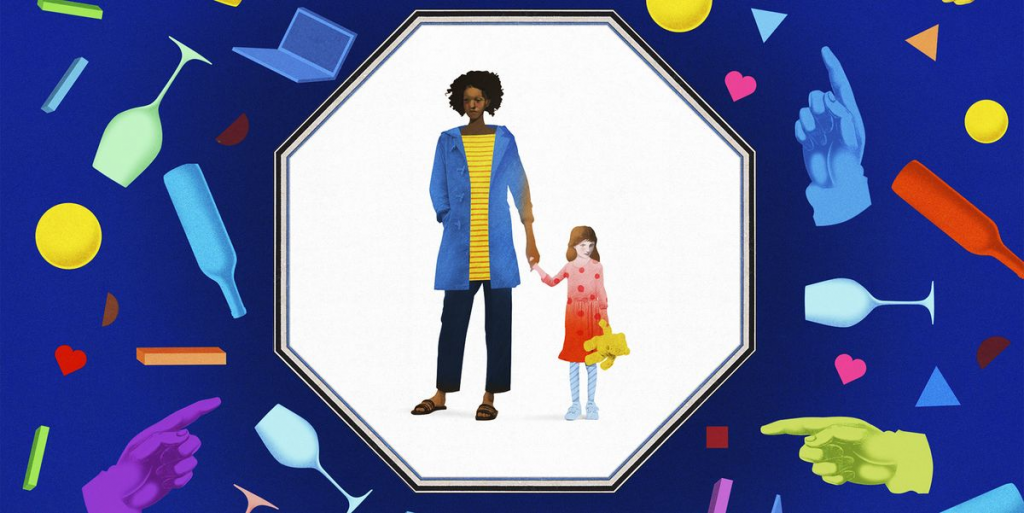
Emira Tucker is a twenty-something recent College graduate who feels rudderless and inadequately equipped for adulthood. Emira who is black, works part time as a babysitter for a wealthy white couple, the Kiley Reid’s novel opens with Emira at her friends 26th Birthday party. The celebrations are interrupted with a phone call from Emira’s boss Alix Chamberlain, asking her to “take Briar to the grocery store for a bit?” (1) Whilst taking care of Briar at the grocery Emira is racially profiled by a security guard, accused of kidnapping the white child she is taking care of. A white bystander, Kelley Copeland, who eventually becomes Emira’s boyfriend records the encounter “I got the whole thing on tape. I would turn it into a news station if I were you.” (16) This fateful encounter changes the trajectories for the characters’ lives, and allows Reid to blur the lines between an employee and boss relationship or an obsessive friendship to seek the cure for white guilt. And raises questions as to whether the relationship between Emira and Kelley is an innocent interracial relationship or a man who has fetish for black women and black culture.

Alix is your quintessential white liberal millennial ‘girlboss’ feminist, with her blog ‘LetHerSpeak’ she has capitalised white female empowerment. “Her propensity for receiving free merchandise quickly turned into a philosophy about women speaking up.” (22) Her brand of feminism is not about empowering women from marginalised backgrounds or even women from a lower class than her, it is corporate, capitalist friendly and entrepreneurial. Alix’s guilt over Emira’s encounter at the grocery store causes her to become obsessed with befriending her. Robin DiAngelo in her novel ‘White Fragility: Why It’s So Hard for White People to Talk About Racism’ dissects the nature of racism in white liberals and the precarious nature of colour-blindness. “I believe that white progressives cause the most daily damage to people of color. I define a white progressive as any white person who thinks he or she is not racist, or is less racist, or in the “choir,” or already “gets it.” Alix never sees Emira as a person, she is instead a vehicle to absolve her from criticism and a racist conflict from high school. She wants Emira to use her youth and blackness to validate her own anxieties, a token black friend, a trophy to win.

Reid, with the grocery store scene created a deeply pertinent case of racial profiling that echoes similar encounters that frequently pop up in the news cycle, a non-existent crime that speaks directly to white prejudice and privilege. The novel is set in 2016, viral videos depicting racial violence and discrimination at the hands of police officers and security guards are heavily discussed topics both in mainstream news media but especially on the internet. Emira has two fears, getting arrested, and going viral. The looming threat of the tape releasing constantly weighs on Emira’s mind. During their relationship Kelley frequently tries to convince Emira to release the tape much to her chagrin and discomfort, “You gotta stop bringing up that tape from Market Depot.” (193) The tape offers opportunities to the people around her, to partake in the role of white saviours. It offers Kelley a chance to posture how not-racist he is, to fetishize and consume her blackness and perceived coolness. As their relationship progresses we see how deeply invested Kelley is with black people and their culture, all his friends are black as are most of his previous girlfriends. He has appropriated traditional African-American style and vernacular, most striking is when he causally uses the n-word in front of Emira. Reid leaves Kelley as ambiguous he isn’t as performative as Alix and does seem at points to genuinely care for Emira but we as readers question if his proximity to blackness is purely good intentioned or is he trying to overcompensate to feel cool, “I probably thought the black kids in high school were much cooler than the white ones.” (225) Reid who herself is married to a White man, does not believe all white men who date black women are simply fetishising them but instead question the difficult questions black women place on themselves particularly the power dynamics of class.

At Thanksgiving we learn about Alix and Kelley’s shared history, it’s left them deeply resentful of each other. I culminates in a contest of ‘Which One of Us Is Actually More Racist’, and Emira is the pawn. “If you’re still okay fetishizing black people like you did in high school, fine. Just don’t pull that shit with my sitter.” (224) Again we see that Emira is devalued and not treated as a human but a trophy to win, and whoever wins her is the least racist. A competition to be more ‘woke’ than the other, an opportunity to tokenise Emira. She will only ever be seen as a caricature of ‘blackness’ for the white people around her, she is the poor black friend who needs to be saved by the white saviour. Thus, is why Alix eventually releases the tape. Alix and Kelley are not insidious villains however, they are results of larger systemic issues of race in America. Such a Fun Age dissects the fetishisation of black women and other systemic issues of micro-aggressions and unconscious bias through the white people in Emira’s life, eventually removing both Alix and Kelley from her life and instead she thinks about her time with the only person who genuinely loved her , Briar.
Bibliography:
DiAngelo, Robin. White Fragility: Why It’s So Hard for White People to Talk About Racism. Beacon Press, 2018.
“Kiley Reid.” The Daily Show, season 25, episode 66. Comedy Central. 2020.
Lea, Richard. Kiley Reid: ‘Some black women say: “I don’t want to explain anything.” I’m not one of them.’ The Guardian, 28th December 2019. https://www.theguardian.com/books/2019/dec/28/kiley-reid-interested-reading-writing-world-we-live-in-debut-novelist
Reid, Kiley. Such a Fun Age. Bloomsbury Publishing, 2019.